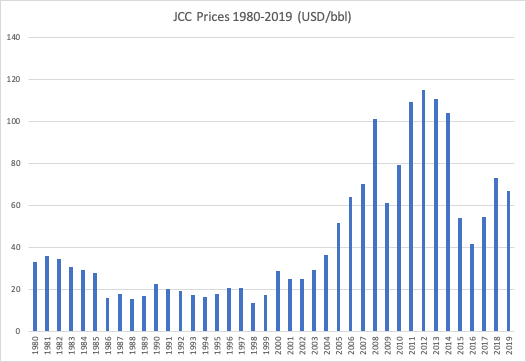User:Popdmas43/sandbox
Practicing Citations[edit]
Crude oil import prices come from the IEA's Crude Oil Import Register and are influenced not only by traditional movements of supply and demand.[1]The linkage of LNG prices to crude oil in Asia was established in the 1970s.[2] Liquefied natural gas became the source of 40% of Japan's power output.[3]
Japanese LNG buyers also see the need for a spot index that properly reflects Asian demand and supply.[4] The Japanese stock market reacts negatively to oil price increases related to oil-market specific demand shocks.[5]
Practice paragraph[edit]
The Japan Crude Cocktail (JCC) refers to the pricing index of Crude Oil used in most East Asian countries. The JCC is the average price of customs-cleared crude oil imports into Japan and is published by the Petroleum Association of Japan. The valuation of the JCC closely reflects the market state of supply and demand. Clear fluctuations in JCC pricing can be linked to distinct events such as the 2007-08 Global Financial Crisis and the 2011 Fukushima Disaster.
Answers to Module 7 Questions[edit]

| Description | Crude Oil import prices in Japan |
|---|---|
| Source | https://www.oecd-ilibrary.org/energy/crude-oil-import-prices/indicator/english_9ee0e3ab-en |
| Date | 13/10/2020 |
| Author | OECD |
| Permission (Reusing this file) | See below. |
I have made a bar graph that depicts the prices of JCC in USD/bbl across the year 1980-2019. I have created this graph myself on excel and the file is formatted as a PNG. I have a Creative Commons Attribution-Share Alike 4.0 International license for this graph. I have added 'oil', 'oil prices' and 'Japan' categories to my work. I described this source as "Crude Oil Price in Japan, 1980-2019 in USD/bbl. Demonstrates the Fluctuations in price over time as it responds to changes in the economy such as the GFC".
- ^ OECD. (2020). Crude oil import prices. Retrieved 8 September 2020, from https://www.oecd-ilibrary.org/energy/crude-oil-import-prices/indicator/english_9ee0e3ab-en
- ^ Stern, J. (2012). The Pricing of Internationally Traded Gas (1st ed., Chapter 11, pp. 338-371). Oxford: Oxford University Press. Retrieved from https://www.oxfordenergy.org/wpcms/wp-content/uploads/Chapter%2011.pdf
- ^ Nikkei. (2017). Japanese LNG prices cool off 6 years after Fukushima. Retrieved 9 September 2020, from https://asia.nikkei.com/Business/Markets/Commodities/Japanese-LNG-prices-cool-off-6-years-after-Fukushima
- ^ Kumagai, T. (2016). Japan’s Oil and LNG Price Evolution on the Path to Transparency. Institute of Energy Economics, Japan. Retrieved from https://www.aie.org.au/data/pdfs/oil_gas_articles/Japan_oil_and_LNG_price_evolution.pdf
- ^ Abhyankar, A., Xu, B., & Wang, J. (2013). Oil price shocks and the stock market: evidence from Japan. The Energy Journal, 34(2), 199–222. https://doi.org/10.5547/01956574.34.2.7

